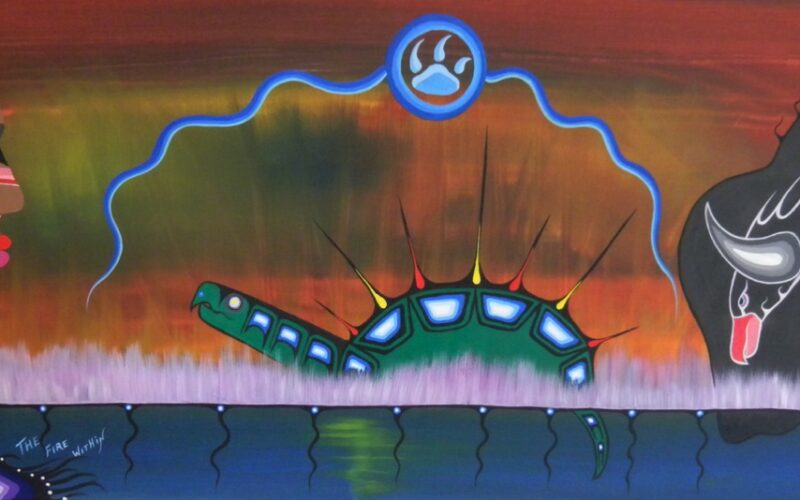Freddy: Painting, Healing & Surviving By L.M. VanEvery
“I died when I was six.”
It was 1951 and Freddy was taking one of his first car rides out of his community of Curve Lake near Peterborough. The government people were driving him to Brantford, the site of the Mohawk Institute Residential School.
For the next ten years, Freddy would fight to survive, stealing food from other students, sneaking out of the school at night to pick through garbage at the city dump so he could eat and enduring years of sexual abuse. He never saw his parents again as long as he was at the residential school.
Freddy describes his first hour at the school as nothing short of horrible. His hair was cut and he was beaten for speaking his traditional Ojibway language.
This was the day Freddy became residential school number 39 and his identity became numerical.
Freddy’s shoes were numbered….39. His clothes were all numbered…39. Freddy was the 39th kid standing in line for food. Everything was 39 for Freddy for the next ten years.
It took Freddy one year to learn English. The more English he learned, the more Ojibway he forgot. He remembers hating the law by the time he turned seven or eight.
Freddy began to notice some of the boys being summoned from their beds late at night. He figured they hadn’t completed their chores from that day and needed to finish them. About two years into Freddy’s nightmare, his turn came. The next day, he told the principal thinking his abuser would be stopped. Freddy was made to stand in a corner for over half an hour and then taken to the playroom in the basement, stripped naked and tied to a chair. He was beaten by the principal and his abuser. Describing the whip they used in visual detail, Freddy recalls this beating like it happened five minutes ago. It was three inches wide with horse studs on the sides.
Freddy’s hatred and anger continued to grow inside his eight year old body. Occasionally Freddy would see his sister at the school. She was four years older. He’d wave to her but if he got caught, he knew the consequences. Sometimes she’d leave him a sandwich in the tall grass so he could eat.
Freddy never went home on weekends or holidays like some students did. Soon, he forgot his parent’s names. He learned how not to care about the things around him. Freddy learned how to survive in a criminal way.
In 1961, Freddy was sixteen years old and was allowed to leave the Mush Hole. The government people drove him back to his community and dropped him off outside of his house. This old woman came out on the step with a bottle of whiskey in her hand. “Oh there’s my little baby.”
Freddy’s family was having a party that day. The alcohol was flowing. Freddy thought they were celebrating his homecoming. This was the first time he drank alcohol. It would take Freddy on a ride of destruction and incarceration for the next 25 years of his life. If Freddy didn’t have a problem, he’d make a problem.
Freddy left his community again not long after returning. Too much had changed. He had changed. Too much was gone out of him.
In 1986, Freddy landed in a hospital with a head injury after falling down a flight of stairs, unable to see, calling out for help. He received the help he desired in a profoundly spiritual way. Freddy likened it to a miracle. His sight was restored and his craving for alcohol was taken away. Freddy immediately knew what he needed to do to heal and he knew he was given the gift to do it.
Today, Freddy paints. He takes the pain and anger that grew in him every day for ten years in residential school and he buries it in each canvas. Through his art, Freddy heals his soul.
When people tell Freddy to get over it and to forget it, he doesn’t understand. “How can you forget that? It’s like it happened yesterday. I’m 67 and I still cry at night. If their good Lord came and sat right here and asked me to forgive them, I’d tell him to move on.”
Even though Freddy can’t forget or forgive yet, he paints and he heals and he doesn’t drink. Maybe that’s all we can ask of him right now.
Writer’s Note: I met Freddy at a Truth and Reconciliation conference sponsored by the Truth and Reconciliation Commission (TRC). The TRC are halfway through their five-year mandate of traveling the country acknowledging residential school experiences, impacts and consequences.
